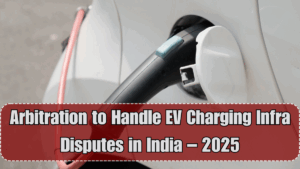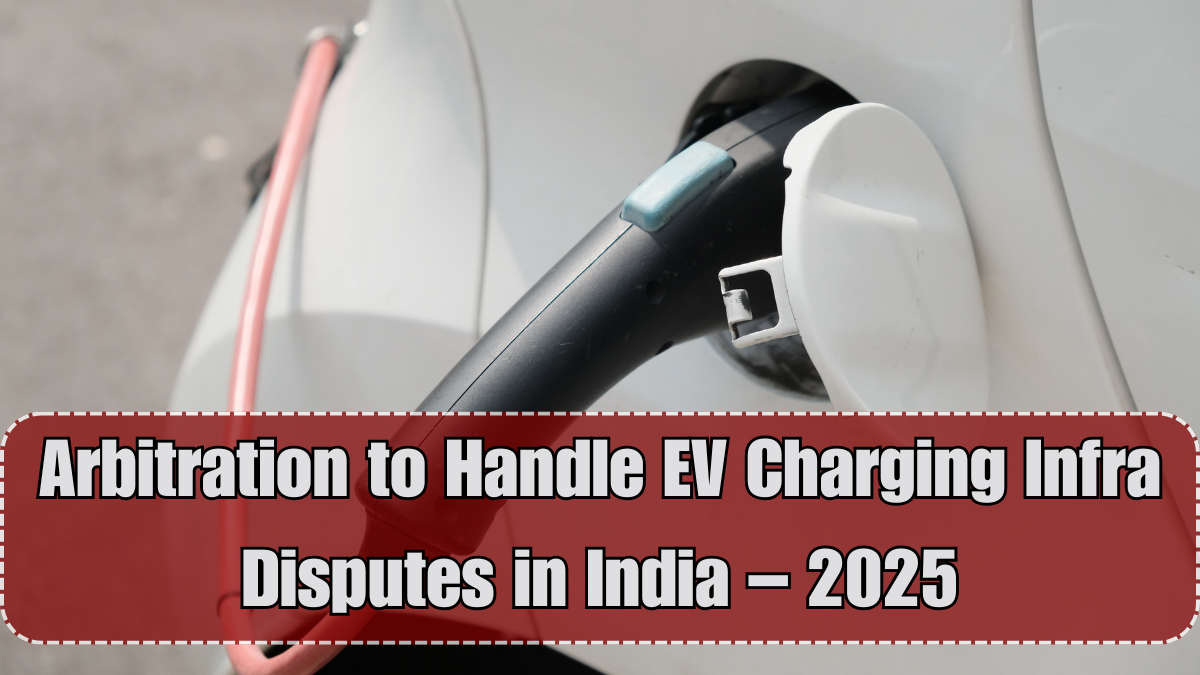As India’s electric mobility revolution accelerates, the infrastructure behind it is rapidly expanding. With that expansion comes conflict — primarily over EV charging infra contracts, land use, service level agreements, and payment disputes. To address these growing tensions, the Indian government has introduced a dedicated arbitration framework in 2025 to resolve all public and private EV charging infrastructure disagreements efficiently.
In recent years, several infrastructure partners, energy companies, and charging station vendors have found themselves entangled in lengthy legal battles over revenue-sharing models, power supply delays, and land acquisition conflicts. With the new arbitration model, such infra disputes will now be settled in a faster, fairer, and structured manner.
This change has already improved investor confidence and is expected to boost private participation in EV infrastructure development across India.

What Triggered the Arbitration Update in 2025?
India’s target of achieving nationwide EV readiness meant a steep rise in EV charging infra contracts signed between the government, DISCOMs, oil companies, and private firms. However, lack of clear dispute resolution mechanisms had led to project delays and contract violations.
Major factors behind the reform:
-
Rise in inter-agency disputes over land rights
-
Conflicts between central and state partners in joint ventures
-
Contract breaches by private station operators
-
Delay penalties and unclear exit clauses in agreements
-
Lack of a central authority to mediate charging infrastructure issues
With this context, the 2025 update brings all EV charging infra contracts under a formal, time-bound arbitration system for the first time.
Key Features of the New Arbitration Framework
This new process ensures that all EV charging infrastructure stakeholders have a formal channel for addressing grievances, disagreements, and policy breaches without lengthy litigation.
Features of the 2025 arbitration model:
-
All contracts must have a mandatory arbitration clause
-
Arbitration panel to include infra law experts and energy consultants
-
Cases resolved within 120 days maximum
-
Online filing and e-tracking of dispute status
-
Applicable to PPP projects, PSUs, private vendors, and startups
By offering fast-track solutions to infra disputes, this system supports India’s goal of reaching 10,000+ EV stations by end of the year.
Table: Dispute Handling – Before and After Arbitration Reform
| Factor | Before 2025 | After Arbitration Reform 2025 |
|---|---|---|
| Resolution Channel | Courts or contract mediation | Central Arbitration Tribunal for EV |
| Time Taken | 6–18 months | 45–120 days |
| Cost of Dispute | High legal fees | Lower, shared between parties |
| Expertise in EV Infrastructure | Limited | Mandatory presence of infra specialists |
| Investor Confidence | Low | Improved with clear framework |
Clearly, EV charging infra contracts are now more reliable and manageable, encouraging more infrastructure growth in tier 2 and tier 3 cities.
How Stakeholders Are Responding
Companies like Tata Power, Adani Total Gas, Fortum, and state DISCOMs have already revised their EV charging infra contracts to align with the new rules. Infrastructure and energy law firms are also training staff to specialize in EV infra arbitration.
Current developments:
-
Retrofitting old contracts with arbitration clauses
-
Establishing dedicated legal desks in infra firms
-
Governments offering contract templates with built-in resolution rules
-
International investors appreciating contract stability
-
State nodal agencies receiving training in the new protocol
This positive shift is expected to prevent major infrastructure roll-out delays in 2025 and beyond.
FAQs
What is the EV charging infra contracts arbitration rule?
It’s a new 2025 policy that makes arbitration mandatory for all public and private EV charging infrastructure disputes in India.
Who can use the arbitration process?
Private companies, PSU partners, state EV agencies, DISCOMs, and any stakeholders involved in an EV infra contract.
How long does the arbitration take?
The process is capped at 120 days, with most disputes expected to be resolved within 2–3 months.
Is the ruling legally binding?
Yes. Awards from this EV arbitration panel are enforceable across India under the Arbitration and Conciliation Act.
Does this apply to old contracts?
Older EV charging infra contracts must be revised with arbitration clauses if parties wish to be covered under the 2025 framework.
Click here to know more.
